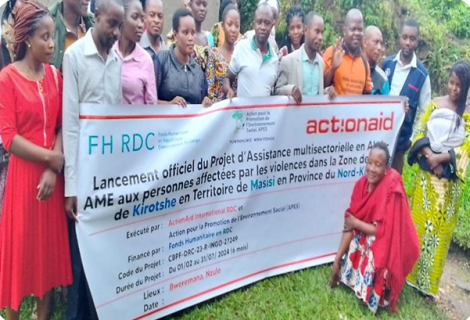Official Launch of ABRIS-AME Project Activities in Kirotshe Health Zone

On February 15, 2024, the community of Bweremana in the Kirotshe health zone, North Kivu, witnessed the official launch of the Multi-Sectoral and Shelter Assistance project, ABRIS-AME
Aimed at supporting people affected by violence in the area, the event, organized at the CPDJ community hall in Mupfunyishanga, brought together a diverse range of participants, including local authorities, community leaders, and representatives of the project's beneficiaries. The ABRIS-AME project, implemented by ActionAid International (AAI) in partnership with the local organization APES, is dedicated to addressing the urgent needs of displaced populations, returnees, and host families in the Masisi territory. Funded by the Humanitarian Fund (FH) DRC, this six-month initiative (February 1 to July 31, 2024) comes with a total budget of $700,000 and focuses on three main areas of intervention: emergency shelter, essential household items, and dignity kits.
Aims and Impact of the ABRIS-AME Project
As violence and displacement continue to disrupt the lives of communities in Masisi, the ABRIS-AME project is a beacon of hope. It seeks to improve the living conditions of internally displaced persons (IDPs) through three key activities:
- Emergency Shelter Assistance: Over 2,583 households will receive emergency shelter support, each valued at $122, providing much-needed relief for families who have lost their homes.
- Essential Household Items: 1,800 kits containing basic household necessities, such as pots, spoons, bowls, and soap, will be distributed to help restore a sense of normalcy to displaced families.
- Dignity Kits: 1,265 dignity kits will be provided to women and girls of reproductive age, ensuring their personal hygiene needs are met even in challenging displacement situations.
Community Support and Participation
The launch event was moderated by Mr. Fabrice Kabane, representing ActionAid International. In his opening remarks, he expressed gratitude to the participants and highlighted the importance of their involvement in the project's success. The project’s objectives and activities were presented by Fauchet APAME, the lead presenter from APES, who outlined how the project’s multi-sectoral approach will provide relief to those affected by violence.
Throughout the session, participants demonstrated strong support for the project, praising the efforts of AAI and APES for their commitment to working in a precarious security environment. Local authorities, community leaders, and displaced persons alike emphasized how critical this project is, especially as schools and churches are currently being used as temporary shelters.
Key Highlights from the Event
- The Bahunde chiefdom representative expressed heartfelt appreciation for the role of AAI and APES in addressing the urgent needs of the displaced population. He assured the community of the authorities' support and encouraged all participants to take ownership of the project.
- Several suggestions were raised by participants, including extending eligibility for essential household items to orphaned children heading households and ensuring dignity kits also reach unaccompanied girls.
- The launch event, attended by 32 participants (13 men, 8 women, including 2 people with disabilities), concluded with a group photo, symbolizing the united effort towards a brighter future for the affected communities.
A Collaborative Effort for Long-Term Change
ActionAid International’s work in the Democratic Republic of Congo (DRC) stretches back to 2002, with a focus on providing support in areas such as education, protection, food security, and shelter. The organization’s commitment to uplifting vulnerable populations, especially women and girls, is evident in projects like ABRIS-AME.
The collaboration with APES, which has a long-standing presence in post-conflict zones, ensures that local expertise is central to the project's success. By working closely with community structures and national partners like UNDP, FAO, and USAID, AAI and APES are helping to rebuild lives in the midst of ongoing conflict.
As the ABRIS-AME project takes its first steps in the Kirotshe health zone, it symbolizes a vital lifeline for thousands of displaced and vulnerable individuals. Through the continued support and collaboration of the community, authorities, and implementing partners, this project promises to make a lasting impact on the lives of those most affected by violence.